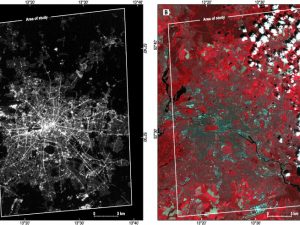
Kotarba A.Z., Aleksandrowicz S. (2016) Impervious surface detection with nighttime photography from the International Space Station. Remote Sensing of Environment Volume 176, April 2016, Pages 295-307, doi: 10.1016/j.rse.2016.02.009
For over two decades nighttime satellite imagery from the Operational Linescan System (OLS) has been used to detect impervious surfaces. However, OLS-based maps suffer from the sensor’s coarse resolution (2.7 km/pixel), overglow, and saturation in

Woźniak E., Kofman W., Wajer P., Lewiński S., Nowakowski A. (2016) The influence of filtration and decomposition window size on the thresholdvalue and accuracy of land-cover classification of polarimetric SAR images, International Journal of Remote Sensing, 37:1, 212-228, doi: 10.1080/01431161.2015.1125548
In this study we use ALOS PALSAR satellite data to classify land cover using a decision tree algorithm. We apply polarimetric decomposition methods to coherence and covariance matrices obtained from the data and then
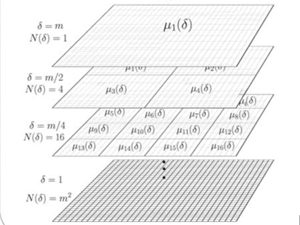
Aleksandrowicz, S.; Wawrzaszek, A.; Drzewiecki, W.; Krupiński, M. (2016) Change Detection Using Global and Local Multifractal Description, IEEE Geoscience and Remote Sensing Letters, Volume: 13, Issue: 8, Aug. 2016, doi: 10.1109/LGRS.2016.2574940
In this letter, we apply the multifractal formalism to land cover change detection on very high spatial resolution data. Specifically, multifractal spectra are determined and, with modifications, are used as an initial general indicator
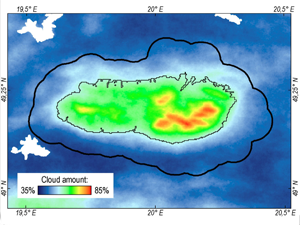
Kotarba A.Z. (2016) Comparison of Differences Between MODIS 250 m and 1 km Cloud Masks. Atmospheric Research, 181, 54-62, doi:10.1016/j.atmosres.2016.06.014
The spatial resolution of remote sensing instruments installed onboard satellites is one of the key factors for accurate estimations of cloud amount. In general terms, the larger the instantaneous field of view (IFOV), the
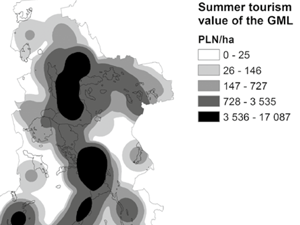
Kulczyk S., Woźniak E., Derek M., Kowalczyk M. (2016) How much is the “wonder of nature” worth? The valuation of tourism in the Great Masurian Lakes using travel cost method, Ekonomia i Środowisko, V.4 Nr.59
W artykule przedstawiono wycenę turystyki jako usługi ekosystemowej w regionie Wielkich Jezior Mazurskich.Wycenę przeprowadzono metodą kosztów podróży,wykorzystując wyniki badania kwestionariuszowego (n=499) i dane statystyczne. Uwzględniono szerokie spektrum elementów: koszty dojazdu, koszt czasu dojazdu, koszty
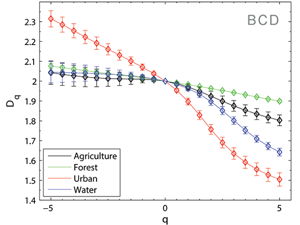
Drzewiecki W., Wawrzaszek A., Krupiński M., Aleksandrowicz S., Bernat K. (2016) Applicability of multifractal features as global characteristics of WorldView-2 panchromatic satellite images, European Journal of Remote Sensing, 49:1, 809-834, doi: 10.5721/EuJRS20164943
In this work we analyse fractal and multifractal characteristics for description and extraction of information from VHR satellite images. We propose the degree of multifractality as a global descriptor of satellite image content and
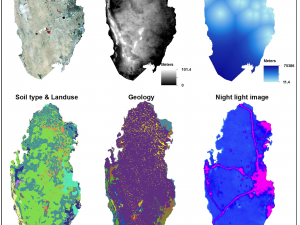
Peng Y., Kheir R.B., Adhikari K., Malinowski R., Greve M.B., Knadel M., Greve, M.H. (2016) Digital Mapping of Toxic Metals in Qatari Soils Using Remote Sensing and Ancillary Data. Remote Sensing, 8, 1003, doi:10.3390/rs8121003
After decades of mining and industrialization in Qatar, it is important to estimate their impact on soil pollution with toxic metals. The study utilized 300 topsoil (0–30 cm) samples, multi-spectral images (Landsat 8), spectral
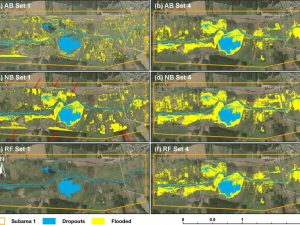
Malinowski R., Höfle B., Koenig K., Groom G., Schwanghart W., Heckrath G. (2016) Local-scale flood mapping on vegetated floodplains from radiometrically calibrated airborne LiDAR data. ISPRS Journal of Photogrammetry and Remote Sensing 2016, 119, 267-279, doi: 10.1016/j.isprsjprs.2016.06.009
Knowledge about the magnitude of localised flooding of riverine areas is crucial for appropriate land management and administration at regional and local levels. However, detection and delineation of localised flooding with remote sensing techniques
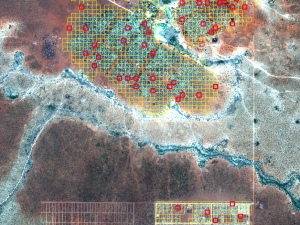
Jenerowicz M., Kemper T. (2016) An improved automated procedure for informal and temporary dwellings detection and enumeration, using mathematical morphology operators on VHR satellite data, Remote Sensing Technologies and Applications in Urban Environments, doi: 10.1117/12.2254808
Every year thousands of people are displaced by conflicts or natural disasters and often gather in large camps. Knowing how many people have been gathered is crucial for an efficient relief operation. However, it
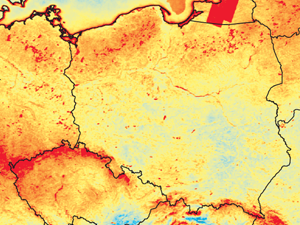
Kotarba A.Z. (2016) Regional high-resolution cloud climatology based on MODIS cloud detection data, Volume 36, Issue 8 30 June 2016 Pages 3105–3115, doi: 10.1002/joc.4539
Most satellite cloud climatologies come in the form of global, low-resolution datasets: so- called ‘gridded’ Level 3 products, resulting from the reprojection and spatio-temporal aggregation of swath (Level 2) data. Their coarse resolution means
 Wersja polska
Wersja polska English version
English version